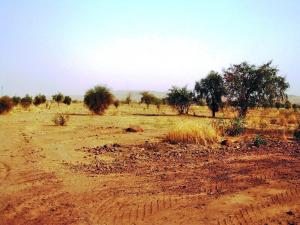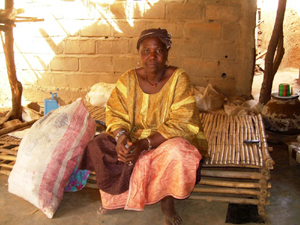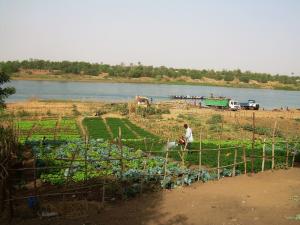MALI: Beyond the drought - “Families will disappear”
“It was the drought that made people move away from here,” Ousmane Touré said in Kayes, 450km northwest of Bamako, the capital of Mali, and a 10-hour bus ride across the scorched scrubland of the western Sahel.

Chronic drought means some families in Kayes have nothing left to share
“There had been a tradition of emigration, but it was when the harvests failed in the 1970s that we saw a real surge in emigration. There was simply not enough to eat, so people took off for France, Germany and the United States. They knew it was only the way of feeding their families back home in Kayes. The same thing is happening this year.”
Touré heads the Association of Returning Migrants of Kayes (AMRK), a welfare organization that tries to provide short-term shelter and counselling to people coming back to this part of the country. The returnees, particularly those from the ethnic Soninké community, which spreads across Mali, Senegal, Mauritania, Gambia and Guinea-Bissau, have played a major role in developing western Mali through their remittances and other cash transfers, giving it a stronger identity and economic base. Many of them are now deportees who have fallen foul of immigration restrictions in France and other countries.
“The emigrants have been well-organized and have always ensured money gets channelled back, building health centres, schools, even roads,” said Touré, but the economic crisis in Europe and tighter immigration controls are having a serious knock-on effect, and impoverished villages can no longer count on the same level of support.
In Mali the three-month rainy season starts in June, with the heaviest falls in July and August. This is the time when everyone participates in the intense agricultural activity of the main cropping season, which provides most of the food for the rest of the year. The lean period occurs in the driest months, just before the next rains come.
For Kayes, the capital of Mali’s First Region, which borders Mauritania, Senegal and Guinea, 2012 is a particularly tough year. Besides the effects of political turbulence elsewhere in the country and a rebellion in the north, serious food security problems appeared months ago, after sparse rains. Surveys by the government and international agencies identified Kayes and the surrounding areas as particularly vulnerable, and likely to be exposed to severe food shortages as an already impoverished population experienced the impact of failed harvests.

Mariam Cissoko, President of a Farmers Association in Kayes
By February, market prices for sorghum, millet, groundnuts and other basic foodstuffs were grossly inflated; food reserves were depleted well ahead of the usual lean season, with alarming shortages of seeds. There were complaints that the government’s emergency food rations had given temporary respite to some villages but had ignored dozens more, as well as serious nutritional concerns, particularly for children. The UN estimated that 1.6 million Malians would be food insecure in 2012.
The events in the capital and the north have overshadowed the food crisis in the west. “A lot of things have been put on standby,” said Abdoulaye Samoura, advocacy officer for NGO Oxfam. “There have been serious delays in getting food distributed.” The dramatic price hikes at local markets in January and February have eased off, but there is no reason for complacency.
“What do you do when there is no food and you have to take care of five, 10, 20 people?” Touré asked. The answer is an exodus of men to Bamako, or across the border into Senegal, or to the gold-mining areas 75km to the south.
Mariam Cissoko, who heads the women’s section of the Association des Organisations Professionnelles Paysannes - Association of Professional Peasant Farmers (AOPP) - in Kayes, confirms that 2012 has been markedly worse. “It rained for only month of the usual three (in 2011) and that has meant drought and everything that comes with it,” she said.
“For us, the Bambara people, we don’t have the same tradition of emigration as the Soninké. We are agro-pastoralists. If you work the land, you will also have some livestock. But there is a strong spirit of solidarity here. In normal times, if you have something in reserve, you will give to those who don’t. But times like these, people just don’t have anything to spare.”
The priorities are stark. “Feed us and feed our animals,” stressed Cissoko. “If NGOs come and talk to us about education, that is all well and good, but we need food first. Without that, everything falls to pieces. People will get sick. Children won’t go to school. Men may be able to take off and look for opportunities elsewhere, but women and children are stuck where they are.”

Market gardening is increasingly important to boost food security
Kayes has been described as the second hottest place in Africa after Djibouti. “I grew up here and I remember an abundance of corn. We didn’t have droughts like we get now,” Cissoko told IRIN. “In the hottest months, the temperature normally goes to 42 or 43 degrees Celsius, but last year it was 47 or 48 at times, in the shade. The desert is advancing and the climatic changes are here for everyone to see. It has all come progressively.”
Food aid from the UN World Food Programme (WFP) and others may ease the problem, but Cissoko says rural communities in the Kayes region are exhausted by the cycle of drought and dependency. They need long-term practical help as they confront shrinking pasture and ongoing food deficits.
“We need proper cereal banks in villages; we need irrigation systems that protect agriculture; we need a credit system that can work, where people can afford the interest rates,” she told IRIN.
Kayes town lies on the banks of the Senegal River. In stark contrast to the dominating barrenness of the western Sahel, the riverbanks are studded with neatly tended plots yielding tomatoes, cucumbers, onions and other crops. This is all part of the maraîchage, or market gardening, that provides women in particular with a livelihood. “When I was a child, people said: ‘You will never get to plant fruit and vegetables here,’” but they were wrong. That was forty years ago. It began timidly, but the gardening has really picked up.”
But Cissoko acknowledges that cereal production is critical, and Ousmane Touré is equally blunt in demanding that the state and its international partners step up their efforts to help Kayes cope with the food deficits and the devastating drought. “What do you do when there is no food?” he asked. “People will not stay here. Families will disappear.”
Source: IRIN
- 380 reads
Human Rights
Ringing FOWPAL’s Peace Bell for the World:Nobel Peace Prize Laureates’ Visions and Actions

Protecting the World’s Cultural Diversity for a Sustainable Future

The Peace Bell Resonates at the 27th Eurasian Economic Summit

Declaration of World Day of the Power of Hope Endorsed by People in 158 Nations

Puppet Show I International Friendship Day 2020

